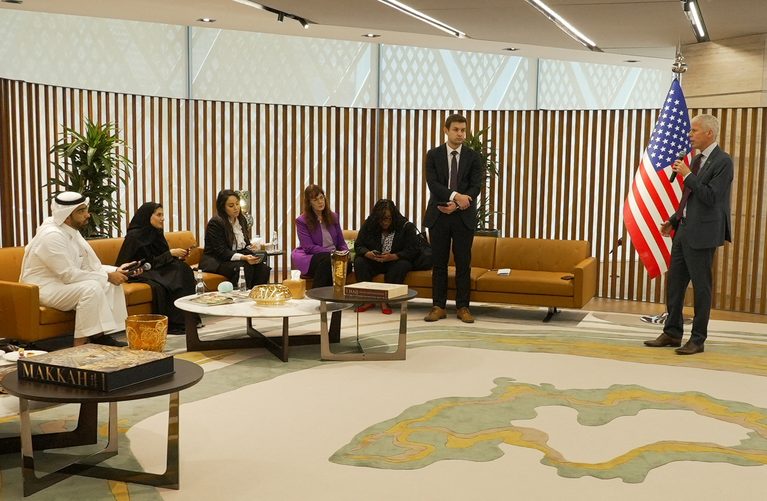The US energy secretary Chris Wright is touring the UAE, Saudi Arabia and Qatar, with high gas exports on his agenda. But his boss’ erratic economic policies threaten to undermine his plans – to the Gulf’s potential advantage.
For some years, the US has touted the benefits of its so-called freedom molecules – a wry term for American gas exports that help allies reduce dependence on countries such as Russia – as part of a strategy of “energy dominance”.
Since 2016 its liquefied natural gas exports have grown from virtually nothing to the US becoming the world’s largest LNG supplier. Exports are on track to double again by 2028, reaching around 190 million tonnes. This surge has played a vital role in filling the gap left by the boycott of Russian gas in European markets.
Wright’s visit has brought immediate dividends. The Abu Dhabi sovereign investor Mubadala Energy has agreed to acquire stakes in gas fields in southern Texas and an LNG export facility in Louisiana.
On April 8 Saudi Aramco signed a deal to purchase LNG – most likely for trading purposes – from the American corporation NextDecade’s Rio Grande project in Brownsville, Texas. In May 2024 Adnoc secured a stake in Rio Grande and committed to buying LNG from the facility.
Aramco is also reportedly in talks to acquire a stake in another LNG plant under construction in Louisiana, owned by the Australian LNG specialist Woodside.
 Reuters/Mohammed Benmansour
Reuters/Mohammed BenmansourAt the same time, Qatar is expanding its previously world-leading LNG capacity from 77 million to 142 million tonnes per annum by the end of the decade. On a smaller scale, the UAE is adding 9.6 million tonnes through Adnoc’s Ruwais plant. Oman is raising its capacity by 4.8 million tonnes with two new projects.
Along with additional supply from East and Northwest Africa, Canada and elsewhere, this sets the stage for heavy oversupply in the second half of this decade. Global LNG demand was about 400 million tonnes last year. It has to increase by more than half over the next five years to absorb this surge of supply.
Most energy analysts focus on the impact of Trump’s tariffs on oil, but LNG is also in the firing line. A possible global recession would only add further pressure, dampening overall energy demand.
With European, Japanese, and South Korean LNG demand stagnant or falling, the hope for new consumers is the large emerging Asian economies: China and India, then Vietnam, Philippines, Indonesia, Pakistan, Bangladesh and others. But it is precisely these countries that were hit with high US tariffs in the first round of Trump announcements.
Tariffs on steel and aluminium will drive up building costs. Qatar’s project delivery and vast scale will keep its new LNG plants cost-competitive
While China faces 145 percent tariffs, the president has at least put a 90-day pause on additional levies on other nations, though all face the new 10 percent rate. Beijing has hit back with its own 125 percent rate on American goods.
This looks problematic for any LNG seller, whether from the US, the Gulf or elsewhere. But the GCC players, especially Qatar, are likely to come out of it best. Frankly, Trump’s actions have damaged the US industry’s prospects.
First, LNG depends on long-term relationships and mutual trust. Qatar’s LNG sales agreements with China have run for 27 years; even for decarbonising Europe, the agreements have been in place for at least 15 years. This is not good for a policy run on caprice. Europe now does not want to be over-dependent on Washington, any more than on Moscow.
Second, the very high tariffs in effect shut out US LNG entirely from China. Even if a trade deal is reached, Chinese buyers cannot risk signing up again except as resellers. If, after 90 days, the US reimposes heavy levies on other trade partners such as the EU or Japan – and they retaliate – it could lose further markets.
Third, the Trump administration’s war on climate science and policy and environmental regulation means its petroleum industry will continue to suffer from high levels of methane leakage, exposing it to European environmental taxes or even an outright ban.
Fourth, lower oil prices mean less output of US-associated gas. North American domestic gas prices will probably hold up better than those of oil, making the feedstock for its LNG plants more costly versus fixed-price Gulf gas.
Fifth, tariffs on materials such as steel and aluminium and the general 10 percent levy on imports will drive up costs for building large metal objects – such as LNG plants. Qatar’s well-oiled project delivery and vast scale will keep its new plants cost-competitive.
So, lower LNG prices beckon for all over the next five years. But Doha won’t mind so much. Clearing out some higher-cost competition is part of its strategy.
The US LNG business is likely to grow massively, but it will not be the financial or strategic bonanza that Houston or Washington thought it would be a few months ago. Decisions may take a minute to reverse, but the LNG industry needs a decade to plan.
Register now: It’s easy and free
AGBI registered members can access even more of our unique analysis and perspective on business and economics in the Middle East.
Why sign uP
Exclusive weekly email from our editor-in-chief
Personalised weekly emails for your preferred industry sectors
Read and download our insight packed white papers
Access to our mobile app
Prioritised access to live events
Already registered? Sign in
I’ll register later



